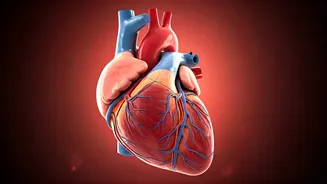Iron Deficiency Unveiled
Iron deficiency is a widespread issue, particularly among women. Signs include fatigue, weakness, pale skin, and headaches. Furthermore, you may experience
shortness of breath, dizziness, and cold hands and feet. Incorporate iron-rich foods like lean meats, poultry, beans, spinach, and fortified cereals into your diet. Consider consulting a healthcare professional for advice on iron supplements if necessary. Ensure that you also consume Vitamin C-rich foods, which can help in better absorption of iron, improving its efficacy.
Vitamin D's Role
Vitamin D is essential for bone health and overall well-being. Its deficiency can lead to bone pain, muscle weakness, and fatigue. To counter this, include foods like fatty fish (salmon, tuna), egg yolks, and fortified foods in your meals. Exposure to sunlight is also vital, as the body synthesizes vitamin D from sunlight. Regular sun exposure for around 15-20 minutes, depending on your skin type, can help boost your vitamin D levels. If you are not getting enough sun exposure, supplements might be required, as advised by your doctor.
Calcium: Bone Builder
Calcium is a cornerstone for strong bones and teeth, and its deficiency can lead to an increased risk of osteoporosis and fractures. Watch out for symptoms such as muscle cramps, brittle nails, and dental issues. Consume calcium-rich foods like dairy products, leafy green vegetables (kale, spinach), and fortified plant-based milk. Maintaining a diet rich in calcium and vitamin D is essential for optimal bone health. Consider including supplements in your diet if your healthcare provider recommends them. Keep a check on your calcium intake and get your bone density checked periodically to track any deficiencies.
Vitamin B12 Deficiency
Vitamin B12 is crucial for nerve function and red blood cell formation. Its deficiency can lead to fatigue, weakness, and neurological issues such as tingling or numbness in hands and feet. For optimal health, include foods like meat, poultry, fish, eggs, and dairy products in your meals. Vegans and vegetarians are at higher risk of B12 deficiency and should consider fortified foods or supplements. Consulting a doctor to check your B12 levels is beneficial, particularly if you have digestive issues that can impair B12 absorption.
Magnesium Matters
Magnesium supports muscle and nerve function, blood sugar control, and blood pressure regulation. Deficiency can manifest as muscle cramps, fatigue, and irregular heartbeats. Include magnesium-rich foods like leafy green vegetables, nuts, seeds, and whole grains. Magnesium also plays a role in energy production, so maintaining adequate magnesium levels can boost energy levels. If you feel you are not getting adequate magnesium, consulting a doctor about potential supplements is advisable. It's important to note the intake of supplements in moderation as advised by your doctor.
Zinc for Immunity
Zinc is essential for immune function, wound healing, and cell growth. Deficiency can impair immunity and wound healing, leading to hair loss, skin sores, and loss of appetite. Include zinc-rich foods such as meat, seafood, nuts, and seeds in your diet. People with certain health conditions or those on specific medications may be at higher risk of zinc deficiency, so regular monitoring is essential. If you suspect zinc deficiency, consult a healthcare provider for testing and possible supplementation.
Vitamin C's Importance
Vitamin C is a powerful antioxidant that supports immune function and collagen production. Deficiency can lead to fatigue, weakened immunity, and skin issues. It's crucial to consume vitamin C-rich foods like citrus fruits (oranges, lemons), strawberries, bell peppers, and broccoli. Since the body does not store vitamin C, consuming it daily through food or supplements is important. Vitamin C aids in the absorption of iron and enhances immune response, therefore, a balanced diet including vitamin C is vital for overall health. If you are a smoker, your body requires more Vitamin C, so consult your healthcare provider to check your Vitamin C levels.
Omega-3 Fatty Acids
Omega-3 fatty acids are essential for brain health, heart health, and reducing inflammation. Deficiency can lead to dry skin, fatigue, and mood swings. Sources of omega-3s include fatty fish (salmon, mackerel, sardines), flaxseeds, chia seeds, and walnuts. These essential fats are not produced by the body and need to be obtained through diet or supplements. Consider incorporating omega-3 rich foods to combat potential deficiencies. If you have any dietary restrictions, it is important to consult a healthcare provider for expert guidance.


















